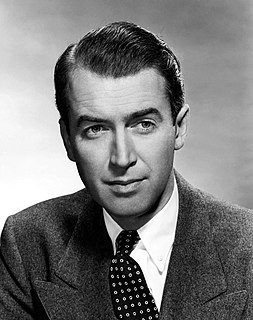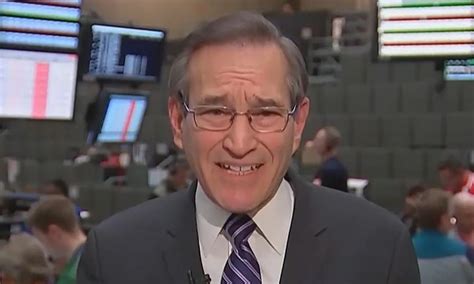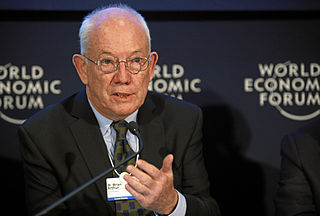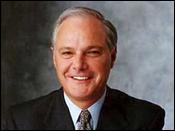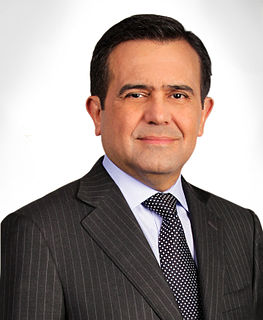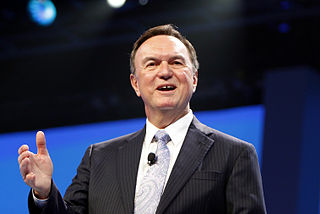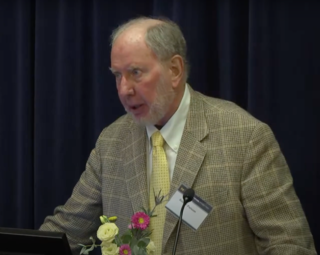Top 1200 Efficient Markets Quotes & Sayings - Page 3
Explore popular Efficient Markets quotes.
Last updated on April 15, 2025.
I think markets are mechanisms that determine prices that are necessary for mass heterogenous populations, and markets do generate levels of technological innovation and productivity that is crucial. But when unregulated, they often generate levels of vast inequality and ugly isolation that makes it difficult for people to relate and connect with one another.
No, ordinary behaviour. The efficient half eats the less efficient half and grows stronger. War is just a violent way of doing what half the people do calmly in peacetime: using the other half for food, heat, machinery and sexual pleasure. Man is the pie that bakes and eats himself, and the recipe is separation.
These people say free markets are the way to go, but wink, wink, the markets aren't really free. They're just a protectionist racket, and we have to pay for it all on every level. It's really quite extraordinary, and immoral, and illegal. These things need to be named, and shamed, and outed, and mocked, and prosecuted.
For me, having a daughter made me much more efficient and productive. I would wake up in the morning trying to figure out how to organize my day so that I could get home. The phone calls with friends, the lunches out with colleagues - all of that got scrapped so that I could be as efficient and productive as possible.
You need a debate and a vote on the principles: Do you want more Europe or less Europe? Do you believe we are more efficient with defense and security with Europe, or not? Do you believe we are more efficient for our companies with or without Europe? Those are the questions we have to discuss and push our people to vote on it.
The international institutions go around the world preaching liberalization, and the developing countries see that means open up your markets to our commodities, but we aren't going to open our markets to your commodities. In the nineteenth century, they used gunboats. Now they use economic weapons and arm-twisting.
In Germany it is good if as many people as possible join initiatives and peaceful demonstrations against the rule of the financial markets. Worshipping the unfettered freedom of global markets has brought the world to the brink of ruin. We now need social and ecological rules for the market economy.
In contrast, markets - oft mythologized as "natural" are the most unnatural things going. Libertarians will tell you "market laws are laws of nature", what baloney. Markets - and the other great modernist cornucopian tools - are magnificent wealth generating machines, built ad-hoc, through trial and error, constantly fine-tuned and refined, tinkered, adjusted.
The main purpose of advertising is to undermine markets. If you go to graduate school and you take a course in economics, you learn that markets are systems in which informed consumers make rational choices. That's what's so wonderful about it. But that's the last thing that the state corporate system wants. It is spending huge sums to prevent that.
The Treasury plan is a disgrace: a bailout of reckless bankers, lenders and investors that provides little direct debt relief to borrowers and financially stressed households and that will come at a very high cost to the US taxpayer. And the plan does nothing to resolve the severe stress in money markets and interbank markets that are now close to a systemic meltdown.
I was a Republican because I thought that those were the people who best supported markets. I think that is not true anymore. I was a Republican at a time when I felt like there was a problem that the markets were under a lot more strain. It worried me whether or not the government played too activist a role.
Competing companies evolve toward efficiency as the more efficient ones profit and expand while those who fall behind fail. And companies being efficient and profiting under the Health Impact Fund, this is exactly what we want, because the company's profit is directly driven by the health impact its registered products achieve.
History speaks pretty clearly that the markets do better with Democrats. Republicans' ideas of what constitutes fiscal responsibility simply are not good for the stock market. Democrats have many tendencies, but one of them is to look after the workers, and actually that tends to be good for demand and good for markets.
Like its agriculture, Africa's markets are highly under-capitalized and inefficient. We know from our work around the continent that transaction costs of reaching the market, and the risks of transacting in rural, agriculture markets, are extremely high. In fact, only one third of agricultural output produced in Africa even reaches the market.
I mean the whole economy just comes to a grinding halt. Competence in markets and in institutions, it's a lot like oxygen. When you have it, you don't even think about it. Indispensable. You can go years without thinking about it. When it's gone for five minutes, it's the only thing you think about. And the oxygen has been sucked out of the credit markets.
Part of my advantage is that my strength is economic forecasting, but that only works in free markets, when markets are smarter than people. That's how I started. I watched the stock market, how equities reacted to change in levels of economic activity, and I could understand how price signals worked and how to forecast them.
The single most significant change has been the globalization of labor markets. Product markets - trade in goods - have been globalizing for years. But now, with the reduction in communication expenses and the building of all sorts of IT infrastructure, essentially any job can be done almost anywhere.
What about precarious labor? It's actually not the most efficient form of labor at all. They were much more efficient when they had loyalty to their workers and people were allowed to be creative and contribute - you know that what precarious labor does is that it's the best weapon ever made to depoliticize labor. They're always putting the political in front of the economic.
A society that relies on generalized reciprocity is more efficient than a distrustful society, for the same reason that money is more efficient than barter. Trust lubricates social life. Networks of civic engagement also facilitate coordination and communication and amplify information about the trustworthiness of other individuals.
In the 40 years I've been working as an economist and investor, I have never seen such a disconnect between the asset market and the economic reality... Asset markets are in the sky, and the economy of the ordinary people is in the dumps, where their real incomes adjusted for inflation are going down and asset markets are going up.





